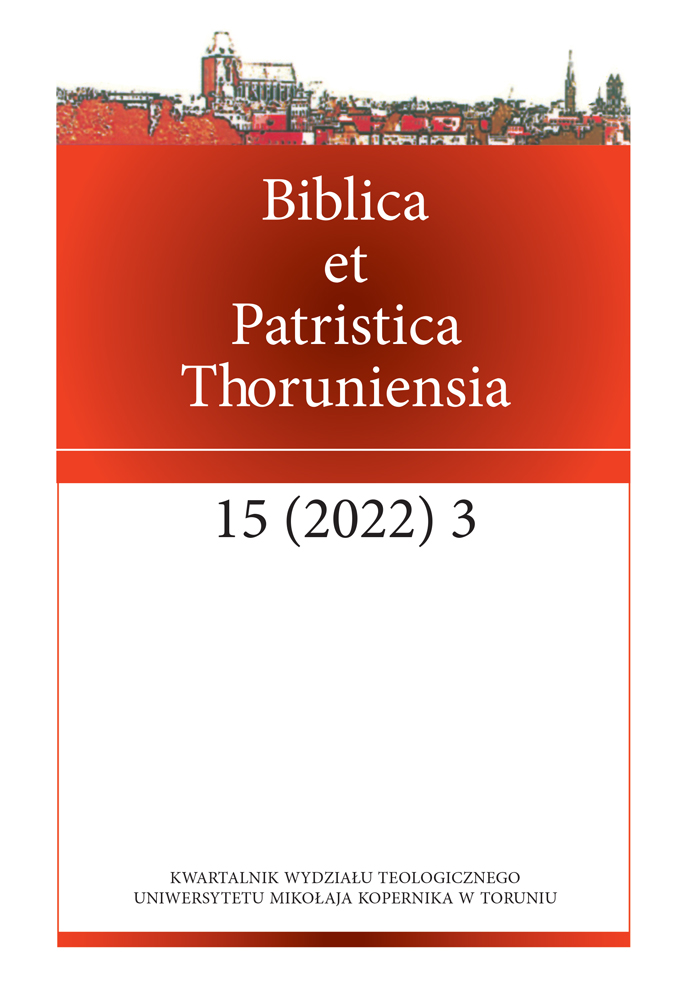Nauczanie Jana Chryzostoma o charyzmatach na podstawie "Homilii do Pierwszego Listu św. Pawła do Koryntian"
DOI:
https://doi.org/10.12775/BPTh.2022.012Słowa kluczowe
charyzmat, Jan Chryzostom, charyzmaty w Kościele starożytnym, Homilie do I Listu św. Pawła do KoryntianAbstrakt
Tematyka charyzmatów w Kościele starożytnym budzi wciąż duże zainteresowanie i jest przedmiotem badań naukowych. Jednym z autorów chrześcijańskich, który wyjaśnia znaczenie charyzmatów był Jan Chryzostom († 407). Przedmiotem powyższego opracowania jest przedstawienie nauczania tego Ojca Kościoła na temat charyzmatów na podstawie jego Homilii do I Listu św. Pawła do Koryntian. W pierwszym punkcie artykułu ukazano zagadnienie pochodzenia charyzmatów i ich cel. W drugim punkcie przedstawiono terminologię, jaką posługuje się Jan Chryzostom w określaniu charyzmatów: duchowy dar, dar łaski, posługiwanie i działanie, objawienie Ducha Świętego. W trzecim punkcie opracowania zaprezentowano poszczególne charyzmaty, w tym dar języków. W czwartym punkcie przedstawiono najważniejszy według autora charyzmat, jakim jest miłość. W ujęciu Jana Chryzostoma charyzmaty pochodzą od Trójcy świętej i są darami, które otrzymuje chrześcijanin w celu budowania wspólnoty Kościoła i nie dla jego własnego dobra, lecz dla dobra wszystkich. To ukierunkowanie na wspólnotowy charakter darów duchowych jest ważnym kryterium w kwestii rozeznawania charyzmatów. Natomiast miłość jest powszechnym i najdoskonalszym darem. Według starożytnego kaznodziei miłość jest drogą, która prowadzi do wszystkich pozostałych charyzmatów. Nauczanie Jana Chryzostoma o charyzmatach jest wciąż aktualne, ponieważ te dary Ducha Świętego obecne są w Kościele w czasach współczesnych.
Bibliografia
Joannes Chrysostomus, In epistulam I ad Corinthios hom. 1–44, hom. PG 9–382, Homilie do Pierwszego Listu św. Pawła do Koryntian, tłum. A. Paciorek, Biblia Ojców (BO), t. II, Częstochowa 2020.
Joannes Chrysostomus, Homilia de Pentecoste, II, 1, PG 50, 453–470.
List Iuvenescit Ecclesia do Biskupów Kościoła katolickiego na temat relacji między darami hierarchicznymi a charyzmatycznymi dla życia i misji Kościoła: https://episkopat.pl/relacja-miedzy-darami-hierarchicznymi-a-charyzmatycznymi-list-kongregacji-nauki-wiary (dostęp 27.01.2022).
Bartnicki, Roman. 2006. „Dary Ducha Świętego w świetle tekstów biblijnych.” Warszawskie Studia Teologiczne 19: 171–184.
Częsz, Bogdan. 2008. „Jan Chryzostom – teolog.” Teologia Patrystyczna 5: 7–12.
Gajewski, Wojciech. 2010. Charyzmat, urząd, hierarchia. Kraków: Wydawnictwo WAM.
Gajewski, Wojciech. 2021. „Charyzmaty w świadectwach epoki ojców apostolskich.” Przegląd Religioznawczy 3: 169–177.
Hughson, T. Ong. 2014. „Is ‘Spiritual Gift(s)’ a Linguistically Fallacious Term? A Lexical Study of Χάρισμα, Πνευμ ατικός, and Πνεῦμα”, The Expository Times 125 (12): 583–592. DOI: https://doi.org/10.1177/0014524613512921
Iluk, Jan. 2008. „Jan Chryzostom objaśnia Hymn o miłości (1 Kor 13) (In I epistolam ad Corinthos hom. 33–34).” Vox Patrum 28 (52): 291–315.
Iluk, Jan. 2005. „Chrześcijańska i żydowska politeia u schyłku antyku.” Przegląd Religioznawczy 1 (215): 71–97.
Iluk, Jan. 2006. Żydowska politeja i Kościół w Imperium Rzymskim u schyłku antyku, t. 1: Jana Chryzostoma, kapłana Antiochii Mowy przeciwko judaizantom i Żydom. Gdańsk: Wydawnictwo Uniwersytetu Gdańskiego.
Kudasiewicz, Józef. 1979. „Rola charyzmatów w Kościele pierwotnym w świetle listów św. Pawła,” W Materiały pomocnicze do wykładów z biblistyki, t. 4, red. S. Łach, M. Filipiak, H. Langkammer, 97–112. Lublin: Zakład Małej Poligrafii KUL.
Kania, Wojciech. 1996. „Caritas u św. Jana Chryzostoma.” Vox Patrum 16 (30–31): 141–150.
Kaczmarek, Sylwia. 2010. „Miłość przebaczająca i jednocząca w świetle Homilii na Ewangelię wg św. Mateusza św. Jana Chryzostoma.” Verbum Vitae 18: 213–244.
Misiarczyk, Leszek. 2013. „Charyzmat prorocki w pierwszych wiekach Kościoła.” Studia Płockie 41: 85–100.
Misiarczyk, Leszek. 2021. „Dar języków w czasach apostolskich: glosolalia, ksenoglosja czy jubilacja?” Biblica et Patristica Thoruniensia 14: 41–64. DOI: DOI: https://doi.org/10.12775/BPTh.2021.002.
Paciorek, Antoni. 2020. „Wprowadzenie.” W Jan Chryzostom, Homilie do Pierwszego Listu św. Pawła do Koryntian, (seria: Biblia Ojców 2), tłum. A. Paciorek, 9–20. Częstochowa: Wydawnictwo Edycja Świętego Pawła.
Paczkowski, Mieczysław. 2008. „Duch przychodzący i działający Dz 2,1–3 w egzegezie homiletycznej Jana Chryzostoma.” Biblica et Patristica Thoruniensia 1 (2008), s. 230–233. DOI: https://doi.org/10.12775/BPTh.2008.012.
Rosik, Mariusz. 2022. Charyzmaty (1 Kor 12,1–12), http://www.mariuszrosik.pl/wp-content/uploads/2017/05/CHARYZMATY.pdf (dostęp 23.03.2022).
Rybak, Paweł. 2016. „Obraz «człowieka duchowego» na podstawie „Homilii na List św. Pawła do Rzymian” św. Jana Chryzostoma.” Biblica et Patristica Thoruniensia 9 (1): 97–118.
Siemieniewski, Andrzej. 2006. „ABC charyzmatów w czwartym wieku – dary duchowe za czasów Atanazego, Bazylego i Cyryla.” Perspectiva, Legnickie Studia Teologiczno-Historyczne 1: 139–151.
Widok, Norbert. 2008. Czasy Jana Chryzostoma i jego pasterska pedagogia (Opolska Biblioteka Teologiczna 105). Opole: Redakcja Wydawnictw Wydziału Teologicznego Uniwersytetu Opolskiego.
Uciecha, Andrzej. 2001. „Grzechy główne i metody walki z nimi w Homiliach św. Jana Chryzostoma na I list św. Pawła do Koryntian.” Vox Patrum 21 (40–41): 247–262. DOI: https://doi.org/10.31743/vp.7983.
Zagórski, Dariusz. 2010. „Miłość (agape) w Homiliach św. Jana Chryzostoma na List do Rzymian.” Biblica et Patristica Thoruniensia 3 (2010), s. 149–158. DOI: https://doi.org/10.12775/BPTh.2010.008.
Żurek, Antoni. 2008. „Bóg miłosierny i do miłosierdzia wzywający.” Teologia Patrystyczna 5: 23–26.
Pobrania
Opublikowane
Jak cytować
Numer
Dział
Licencja
Prawa autorskie (c) 2022 Michał Kieling

Utwór dostępny jest na licencji Creative Commons Uznanie autorstwa – Bez utworów zależnych 4.0 Międzynarodowe.
CC BY ND 4.0. Posiadaczem prawa autorskiego (Licencjodawcą) jest Autor, który na mocy umowy licencyjnej udziela nieodpłatnie prawa do eksploatacji dzieła na polach wskazanych w umowie.
- Licencjodawca udziela Licencjobiorcy licencji niewyłącznej na korzystanie z Utworu/przedmiotu prawa pokrewnego w następujących polach eksploatacji: a) utrwalanie Utworu/przedmiotu prawa pokrewnego; b) reprodukowanie (zwielokrotnienie) Utworu/przedmiotu prawa pokrewnego drukiem i techniką cyfrową (e-book, audiobook); c) wprowadzania do obrotu egzemplarzy zwielokrotnionego Utworu/przedmiotu prawa pokrewnego; d) wprowadzenie Utworu/przedmiotu prawa pokrewnego do pamięci komputera; e) rozpowszechnianie utworu w wersji elektronicznej w formule open access na licencji Creative Commons (CC BY-ND 3.0) poprzez platformę cyfrową Wydawnictwa Naukowego UMK oraz repozytorium UMK.
- Korzystanie przez Licencjobiorcę z utrwalonego Utworu ww. polach nie jest ograniczone czasowo ilościowo i terytorialnie.
- Licencjodawca udziela Licencjobiorcy licencji do Utworu/przedmiotu prawa pokrewnego nieodpłatnie na czas nieokreślony
PEŁEN TEKST UMOWY LICENCYJNEJ >>
Statystyki
Liczba wyświetleń i pobrań: 863
Liczba cytowań: 1



